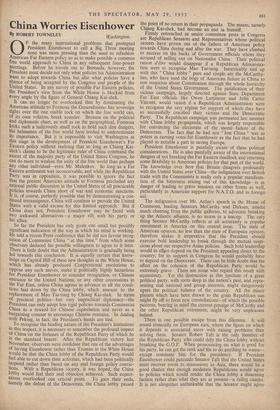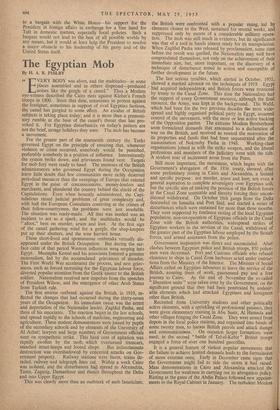China Worries Eisenhower
By ROBERT TOWNELEY Washington.
F the many international problems that prompted President Eisenhower to call a Big Three meeting none was more pressing than the need to refashion American Far Eastern policy so as to make possible a common free world approach to China in any subsequent four-power meetings. Before he travels out to Bermuda, however, the President must decide not only what policies his Administration Want to adopt towards China but also what policies have a chance of being accepted by the Congress and people of the United States. In any survey of possible Far Eastern policies, the President's view from the White House is blocked from every angle by the figure of General Chiang Kai-shek. It can no longer be overlooked that by dominating the American attitude to Formosa the Generalissimo has sovereign rights over the one visible rock on which the free world can, of its own volition, break asunder. Because on the political and diplomatic chart, as well as on the geographical, Formosa looks such a ludicrously small rock to hold such dire dangers, the helmsmen of the free world have tended to underestimate its importance. But it is impossible to visit Washington at this stage in the development of President Eisenhower's Far Eastern policy without realising that so long as Chiang Kai- shek's claims to be the legitimate ruler of China command the assent of the majority party of the United States Congress, he can do more to weaken the unity of the free world than perhaps any other individual—even Mr. Malenicov. So long as a Far Eastern settlement was inconceivable, and while the Republican Party was in opposition, it was possible to ignore the fact that the present American attitude to Formosa precluded any rational public discussion in the United States of all practicable policies towards China short of war and economic sanctions. It is, of course, perfectly possible that by demonstrating a con- tinued intransigence, China will continue to provide the United States with a valid excuse for this limited approach. But if China does not, President Eisenhower may be faced with two awkward alternatives—a major rift with his party or his allies.
So far the President has only given one small but possibly significant indication of the way in which his mind is working. He told a recent Press conference that he did not favour recog- nition of Communist China "at this time," froM which some observers deduced his possible willingness to agree to it later. There is little doubt that the Administration is gradually being led towards this conclusion. It is equally certain that know- ledge on Capitol Hill of these new thoughts in the White House, Which has already produced Congressional resolutions to Oppose any such moves, make it politically highly hazardous for President Eisenhower to consider recognition, or Chinese entrance to the United Nations, or any other concessions in the Far East, unless China agrees in advance to all the condi- tion laid down by the China lobby, which amount to the replacement of Mao Tse-tung by Chiang Kai-shek. In terms of .practical politics—but very impractical diplomacy—the President can only adopt less rigid policies towards Communist China as a reward for Chinese capitulation and never as a bargaining counter to encourage Chinese restraint. In dealing with Peking, in fact, the President's hands are tied. To recognise the binding nature of the President's limitations to this respect, it is necessary to remember the profound impact of China on the fortunes of the Republican Party of which he is the standard bearer: After the Republican victory last November, observers were confident that one of the advantages of having Eisenhower rather than Truman in the White House would be that the China lobby of the Republican Party would feel able to cut down their activities, which had been politically inspired rather than based on any real foreign policy convic- tions. With a Republican victory, it was hoped, the China lobby would feel their real objective achieved. Such expect- ations overlooked one crucial point. To gain their ends, namely the defeat of the Democrats, the China lobby passed the point of no return in their propaganda. The means, namely Chiang Kai-shek, had become an end in himself.
Firmly entrenched in senior committee posts in Congress are Republican Senators and Representatives whose political careers have grown out of the failure of American policy towards China during and after the war. They have climbed to success on the backs of Government officials whom they accused of selling out on Nationalist China. Their political raison d'être would disappear if a Republican Administra- tion were to recognise Mao Tse-tung. Inextricably tied up with this "China lobby" pure and simple are the McCarthy- hes, who have used the bogy of American failure in China to sow suspicion about Communism through the whole hierarchy of the United States Government. The justification of their vicious campaign, largely directed against State Department Far East officials like Owen Lattimore and John Carter Vincent, would vanish if a Republican Administration were to recognise the very regime for support of which they have so successfully crucified their victims and the Democratic Party. The Republican campaign was permeated last summer with China lobby propaganda, which was largely responsible for convincing the electorate of the moral failure of the Democrats. The fact that he had not "lost China" was as potent in earning votes for Eisenhower as the fact that he had played so notable a part in saving Europe.
President Eisenhower is painfully aware of these political considerations. He is also painfully aware of the international dangers of not breaking the Far Eastern deadlock and returning some flexibility to American policies for that part of the world. The knowledge over here that Britain disagrees profoundly with the United States over China—the indignation over British trade with the Communists is really only a popular manifesta- tion of the bitterness arising out of this knowledge—is in danger of leading to grave tensions on other fronts as well, particularly in American support for N.A.T.O. and in foreign aid.
The indignation over Mr. Attlee's speech in the House of Commons, leading Senators McCarthy and Dirksen, amidst much cheering from the public galleries, to advocate breaking up the Atlantic alliance, is no storm in a teacup. The only thing Senator McCarthy reflects at all accurately is popular resentment in America on this central issue. The state of American opinion, no less than the state of European opinion, therefore makes it imperative that the President should exercise bold leadership to break through the mutual suspi- cions about our respective Asian policies. Such bold leadership would in effect depend on the President appealing direct to the country; for its support in Congress he would probably have to depend on the Democrats. There can be little doubt that the effect on the cohesion of the Republican Party would be extremely grave. There are some who regard this result with equanimity. ' Yet the destruction at this juncture of a great political party, with roots deep in the nation's past, and repre- senting real national and group interests, might dangerously upset the political balance of the country. All the minor planets which have been drawn to "the great Republican sun might fly off to form new constellations—of which the possible patterns, bearing in mind the current prestige of McCarthy and the other Republican extremists, might be very unpleasant indeed. There is one possible escape from this dilemma. It will sound ironically on European ears, where the figure on which it depends is associated more with raising problems than solving them. Senator Robert Taft is the only thember of the Republican Party who could defy the China lobby without breaking the G.O.P. When pronouncing on what is good for his party, he can get the rank and file to do anything he wants— except nominate him for the presidency. If President Eisenhower could persuade Senator Taft that the United States must recover room to manoeuvre in Asia, there would be a good chance that enough moderate Republicans would agree to policies which would render the China lobby a dissenting faction rather than what they are at present—a ruling caucus. It is not altogether unthinkable that the Senator might agree to a bargain with the White House—his support for the President in foreign affairs in exchange for a free hand for Taft in domestic matters, especially fiscal policies. Such a bargain would not lead to the best of all possible worlds by any means, but it would at least help the President to resolve a major obstacle to his leadership of his party and of the United States itself.



































 Previous page
Previous page